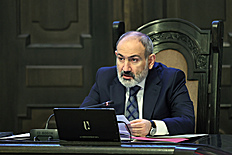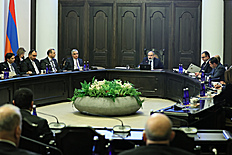Press releases
Prime Minister's speech regarding the satisfaction of Armenia's request by the International Court of Justice on unblocking of the Lachin Corridor
A regular Cabinet meeting took place today, chaired by Prime Minister Nikol Pashinyan.
Before the discussion of the session's agenda, the Prime Minister gave a speech in which he referred to the satisfaction of Armenia's request by the International Court of Justice on indication of provisional measures regarding the unblocking of the Lachin Corridor.
In his speech, Nikol Pashinyan noted.
"Dear participants of the Cabinet meeting,
Dear people,
As you know, in connection with Azerbaijan's illegal blockade of the Lachin Corridor, in December of last year, the Republic of Armenia urgently applied to the International Court of Justice to indicate provisional measures within the framework of the "Armenia v. Azerbaijan" case, which is being examined within the framework of the International Convention on the Elimination of All Forms of Racial Discrimination, asking the court to oblige Azerbaijan to stop illegal blockade of Lachin Corridor.
On January 4 of this year, Azerbaijan presented a counterclaim against Armenia, which was related to the alleged placement of mines by Armenia.
The court published its ruling yesterday, satisfying Armenia's claim and rejecting Azerbaijan's claim. By the legally binding ruling, the court obliged Azerbaijan to take all measures within its reach to guarantee uninterrupted movement of citizens, vehicles and cargo in both directions through the Lachin Corridor. The court emphasized that its decision creates binding legal force for Azerbaijan.
Dear Colleagues,
This is an extremely important decision, the purely legal interpretation of which has been addressed by expert lawyers, but I would like to address the political effect and significance of this decision.
The International Court of Justice recorded that the Lachin Corridorhas been closed since December 12, 2022. This may seem like a strange record for our public in the sense that the closure of Lachin Corridor is obvious to all of us, but Azerbaijan claimed in all international instances that Lachin Corridor is not closed. To what extent the representatives of the international community believed in that is another question. But with this, Azerbaijan's practice of misleading the international community was recorded, and it was recorded by the world's highest court.
The second important circumstance is that the court recorded the responsibility of the Azerbaijan state for the closure of the Lachin Corridor, essentially not considering the closure of the corridor by eco-activists to be serious, and obliged Azerbaijan to open the corridor.
The next point is that the court reaffirmed the position of the Republic of Armenia that according to the trilateral declaration of November 9, 2020, the Lachin Corridor should not be under the control of Azerbaijan, and Azerbaijan is obliged under the same document to guarantee the safety of the movement of citizens, vehicles and cargo through the Lachin Corridor from Nagorno Karabakh to Armenia and from Armenia to Nagorno-Karabakh, and the Lachin Corridor should be under the control of the peacekeeping force of the Russian Federation. Basically, the court recorded that this is Azerbaijan's obligation, its international obligation.
Another important point is that the court clearly recorded the existence of the Nagorno-Karabakh entity in accordance with the trilateral declaration and its provisions of November 9, 2020. Among them, legal significance was attached to Nagorno Karabakh and the presence of the contact line.
At the same time, the court noted that as a result of the closure of the Lachin Corridor, the supply of food, medicine, and other essential goods to Nagorno-Karabakh was disrupted, ethnic Armenians' access to a number of vital medical services was limited, thus confirming the fact that there is a humanitarian crisis in Nagorno-Karabakh.
The court considered that Armenia did not provide sufficient evidence that Azerbaijan is to blame for the interruption of natural gas and electricity supplies to Nagorno-Karabakh. Of course, the reason for such a situation is that the valve of the pipeline supplying gas to Nagorno Karabakh is located in a place out of Armenia’s reach. The same can be said about the power cut-off point. Here, really, Armenia could not present direct irrefutable evidence. But this also means that the moment we are able to obtain direct evidence, we will be able to go to court again on that basis and the likelihood that the court will satisfy this claim as well will be high. At the moment, however, the gas supply to Nagorno Karabakh is being fully carried out.
Dear participants of the Cabinet meeting,
Dear people,
I have already said that the International Court of Justice unequivocally rejected Azerbaijan's request to indicate provisional measure against Armenia, by which Azerbaijan accused Armenia of some kind of mining. Thus, we can record that the groundless accusations against Armenia about placing mines, which have been raised for several months on all international platforms, collapsed, and this is extremely important.
Returning to the issue of Azerbaijan's obligation to open the Lachin Corridor, provided for by the court, I must emphasize that Azerbaijan must make visible efforts, take measures to open the Lachin Corridor. The very first and simplest step could be, for example, calling on the "eco-activists" from the highest echelons of authorities to open the Lachin Corridor. In any case, the lack of specific actions by Azerbaijan to open the Lachin Corridor can and should lead to specific international consequences.
Thank you for attention."

